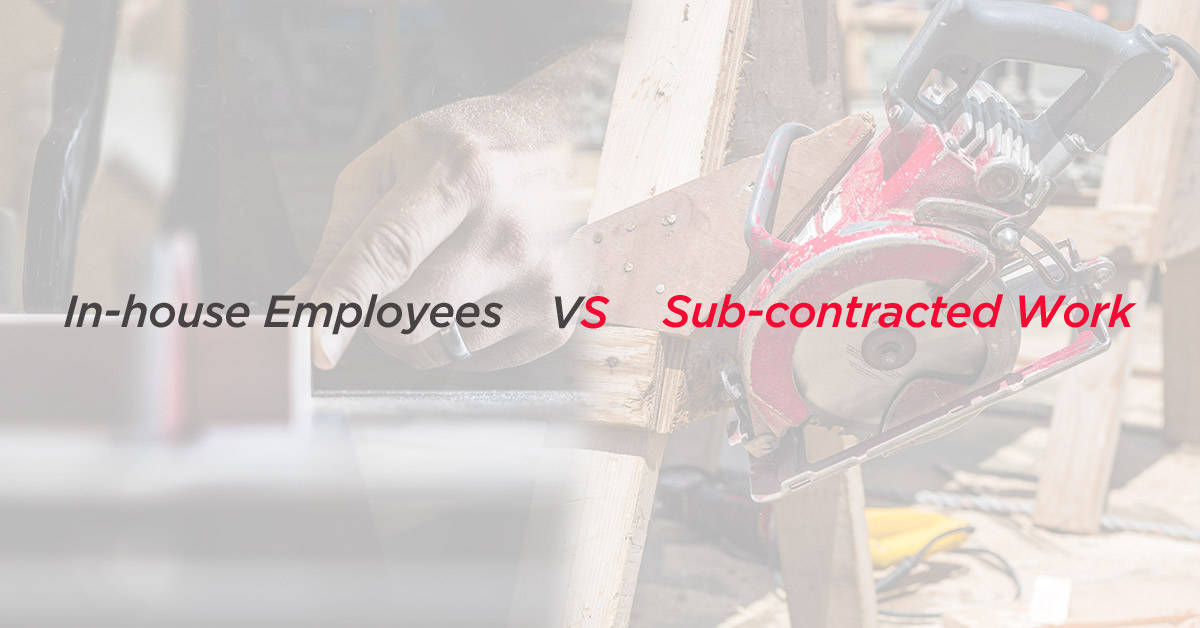Pros and Cons of Subcontractor Work vs the Stability of In-house Employees
If you’re like a lot of homeowners, you probably do some of your own home repair and renovation. There’s certainly a wealth of information on YouTube that can take you a long way in the do-it-yourself (DIY) process. But at some point, you may need some work done that exceeds your capabilities, whether in terms of tools or skills. Or maybe it’s just such a huge project that you don’t have the time to complete it on a reasonable schedule. The question then becomes what kind of contractor to hire? In this article we’ll discuss the pros and cons of sub contracted work vs. the stability of in-house employees used by licensed contractors.

The Age-Old Question About Residential Contractors
When you decide to hire a contractor, you’ll probably find a lot of options out there, some of them licensed, some of them not, some expensive, and some puzzlingly cheap. You’ll likely have choices that include both licensed and unlicensed contractors, and it’s important to consider the risks and advantages of both options before you make a decision.
Advantages of Licensed Contractors Who Hire Skilled, In-House Employees
A Simpler, More Professional Process
Licensed contractors have employees who do construction work every day, month after month, which makes it more likely they’ll be efficient, courteous, and skilled at their jobs. It’s inconvenient enough to have strangers in and around your home during construction, and you should feel assured that the work will be done quickly, neatly, and with minimal inconvenience to your family. A good licensed contractor chooses employees based on this service model.

If parts of the project require different specializations, and you choose to work with unlicensed contractors, you’ll have to oversee the big picture of your project, which is trickier than it looks. Projects involving multiple contractors can be challenging to schedule efficiently if you don’t understand all the ins and outs of each type of work and how to weave their schedules together in an efficient way. When a single contractor brings all the necessary employees to do the job, it can take a lot of headaches out of your way. And the contractor will make sure the work is done correctly, in budget, on time.
Your only challenge when dealing with a reliable, licensed contractor is to make sure they understand your goals, and that you understand the agreed-upon scope of the project. A good contractor will also be a good communicator, and this is essential.
Um, It’s Legal for them to do the Work
If you’re in Wichita / Sedgwick County or most other urban places in Kansas, contractors are legally required to be licensed; it’s as simple as that. Licensing is required for a lot of good reasons, most of them designed to protect you, the customer. If a contractor fails to adhere to any licensing requirements, they can lose their license, so they’re extremely motivated to stay within established boundaries of legality, ethics and safe practices.
Insurance (This is a Big One)
Contractors carry insurance that protects customers, as well as themselves. If your property is damaged during a renovation—or worse yet, someone is injured, the contractor’s insurance is there to offset any associated costs. Workers Compensation Insurance takes care of injuries to the contractor’s employees, and other types of insurance are there to cover property damage, personal injury to non-employees and substandard work.

The Little Things are Somebody Else’s Problem
Even the most avid do-it-yourselfer can quickly get frustrated when the inevitable “little things” come up during a project. Same with a non-licensed contractor, who may be a great carpenter, but if he runs into unexpected plumbing or electrical issues during construction, the project can suddenly get complicated, perhaps requiring skills he lacks in order to make course adjustments. But a licensed contractor deals with these issues all the time. He or she has employees to deal with them and understand what they mean to the overall job.
Locally Owned Contracting Companies Have an Edge
An out-of-town contractor may do really great work, but a local one will understand how that work affects the value of your home. He may have experience with before-and-after appraisals for similar properties in your area, and can advise you on various project options that affect your home’s value differently.
Maybe you’re having the work done because you like the way it looks and aren’t that concerned about a return on your construction investment, but it’s still good to have informed options, going into a project.
If part of your remodeling goal is to maintain or increase your home’s value, a local contracting partner can guide you to options that bring the best return on your investment.
You Don’t Have to Deal with Licensing, Permits, and other Blah, Blah, Blah
If, in your DIY experience, you’ve ever tried to read and understand local building codes, you know it’s about as much fun as watching paint dry—and it can eat up a lot of your time to reach a point where you understand how the work has to be done. Again, contractors do this all the time. They understand building codes, permit requirements, and liability issues. As a homeowner, you can quickly find yourself in deep water trying to make sense of what appears, at first, to be a simple project, and the same is true of many non-licensed contractors.
Liability brings its own can of worms to a construction job—which we’ll discuss below, and a licensed contractor already has the right insurance and understanding of safety practices to keep you, the homeowner, out of trouble.

Some Remodeling Projects are Full-Time Jobs
Larger renovations can go on for days—or even weeks—especially when you try to tackle them on your own in your spare time. But a job that will take you five weekends to complete, may be a one- or two-day project for an experienced professional who devotes his full-time attention to it.
And, yes, some projects go on for weeks even when you hire a pro, but this can make a good contractor even more valuable because they have systems in place to:
- • Do the work as efficiently as possible.
- • Keep construction areas clean and safe as the work progresses.
- • Organize the process in ways that inconvenience your family as little as possible.
Lenders Require the Use of Licensed Professionals
If your project is ambitious enough that you need to borrow money for it, your financial institution will probably require you to hire a licensed professional to do the work. There are instances in which some banks have loaned money for renovations that were performed by non-licensed remodelers, but it’s rare, and the bank typically requires those contractors to demonstrate a high level of experience and a strong track record. Most contractors with these traits are licensed.

The Risks of Hiring an Unlicensed Remodeling Contractor
Let’s face it: the biggest attraction of hiring non-licensed help is the price. Of course they can charge less because they don’t have the same overhead as their licensed counterparts; no workers comp insurance, liability insurance—and even the cost of acquiring and maintaining a contractor’s license is no small sum. Reputable professionals understand the value of playing by the rules, both, to themselves and their customers, so they “pay their dues” for good reasons. When you choose someone to work on your home, these protections extend to you, as well, and they’re worth the extra money.
The second-biggest attraction is the “brother-in-law” phenomenon; you happen to know somebody whose friend, family member or brother-in-law does remodeling work (unlicensed). You’ve heard some good things about their work, and they come recommended by a friend, so you think, “How could anything go wrong?”
But because non-licensed people aren’t constrained by building codes that assure “best practices,” they may cut corners to keep the job within your budget, skipping steps that can cost you money later. The Internet is rich with horror stories of non-licensed contractors who:
- Take money in advance, then never complete the project.
- Fail to upgrade structural components according to code, making the home uninsurable during the homeowner’s next insurance audit, or when an insurance claim is made on the home due to natural disaster or other causes.
- Have to come back multiple times to fix their work because it was shoddily performed.
- Leave nails and debris around the job site during and after the renovation, creating liability (and a nuisance) for the homeowner.
- Use sub-par equipment or materials to complete the job, for which you may not see the symptoms for months or years, which means you may have to pay to have the same work done again.

How Can Unlicensed Contractors Work so Cheap?
Low Overhead
Anybody can buy spend a few hundred dollars on tools and hire themselves out as a contractor. Yes, having the right tools is part of the job, but other aspects are equally important. With a licensed professional, you can confirm a track record of reliable work and a desire to protect their reputation in the community by continuing to do good work.
Professional contractors undergo stringent procedures to become licensed, which isn’t cheap. Then they have to maintain that license, which involves steep annual fees. All the money they pay into this is used by government entities to identify and codify best practices that have proven to guarantee a good finished product to homeowners.
Unlicensed workers, on the other hand, don’t have any of these overhead costs. Or assurances.
No Legal Liability
A licensed contractor is legally required to carry certain types of insurance. Your friend’s brother-in-law may be good with tools, but he probably doesn’t have insurance—this is one of the ways unlicensed contractors save money. Liability and workers compensation insurance is expensive, and these contractors usually skirt the law by not paying for either.
The Liability for Unlicensed Contract Work Falls on the Homeowner
This can be a much bigger problem than most homeowners realize. When a contractor doesn’t carry liability insurance, the property owner is legally responsible for everything from bad workmanship to injuries at the worksite.
When you hire a licensed professional, they are considered an employer on a job site, and anything that goes wrong rests firmly on their shoulders, from a legal standpoint. But when you choose the unlicensed option, you are the employer, in the eyes of the law. If the contractor or one of his helpers is injured, you can be held legally and financially responsible. If they choose to sue you for expenses, you could find yourself on the hook for steep legal and medical bills. With today’s attorney and health care costs, even a minor injury could add hundreds or thousands of dollars to the cost of your project.
Even worse is the possibility that a neighbor or guest is injured on the job site. Since it’s not legally considered to be a job site because there is no licensed contractor involved, all financial liability falls on the homeowner. As the contractor’s employer, you’re responsible for everything they do, including unsafe or negligent practices. Most homeowner’s insurance will not cover this type of liability because they, too, expect the homeowner to make the responsible decision of working only with licensed professionals.
What could go wrong? If you’re a DIYer, you know how easy it is for someone to walk into the middle of your project and step on something, bump into something, or just stand in the wrong place at the wrong time. If a friend or neighbor is hurt when they come to check out your exciting construction project, the cost will probably come out of your bank account. With a licensed pro, all of that liability is placed on the contractor.
Being Bonded Matters, a Lot
The other cost that falls on your shoulders in an unlicensed work scenario is that of redoing poor workmanship. Yes, your brother-in-law may agree with you that some part of the project needs to be reworked, and he may even agree to pay for it, but he isn’t required to. A requirement of having a contractor’s license is to be bonded. This is another type of insurance that protects the customer in cases where a contractor fails to adequately perform the required work for a construction project. This type of insurance covers you, the homeowner, if a contractor does shoddy work.

Unlicensed Contract Work can Lower the Value of Your Property
If you decide to sell your home at some point, you’ll need an inspection from an appraiser, which could expose issues caused by unlicensed contractors cutting corners and lower the property value. It’s important that all required building permits are procured, and all codes are followed when you have work done on a property. Unlicensed contractors are not allowed to obtain these permits, so you place your investment at risk in the long run by hiring one.
You’ll also be required to fully disclose this kind of information to a buyer when you sell the place, which can cut into your pocketbook during negotiations.
Even if you plan to keep your home, your insurance company may, from time to time, require inspections before insuring some structures. If the inspector finds that subpar or non-code-compliant work has been done on the house, the insurer may require you to bring the problem into compliance before providing the insurance you need.
Sometimes, “Cheap” isn’t Cheap
Sometimes we get truly great deals in life, but more often, a price that looks too good to be true is too good to be true. Best of luck if you decide to hire an unlicensed contractor. Hopefully, everything goes smoothly, but there are a lot of ways for a construction project to go wrong, and when that happens, a cheap contractor can turn into a huge expense.
We all love bargains, but when it comes to a residential property, quality is more important than price. Hiring a licensed contractor with in-house employees takes the risk off your shoulders, assures a smoother and more pleasant construction process, and provides the peace of mind that comes from knowing you won’t have to deal with unexpected costs.
Don’t take the risk of hiring an inexperienced or unlicensed contractor. After your home is one of your most valuable investments. Call Above and Beyond Roofing and Construction for trusted, reliable, licensed contracting at (316) 719-2819 for all you exterior remodeling and general contracting needs. Our licensed staff will take care of your investment as if it were their own.

